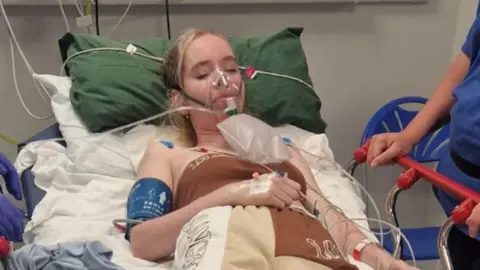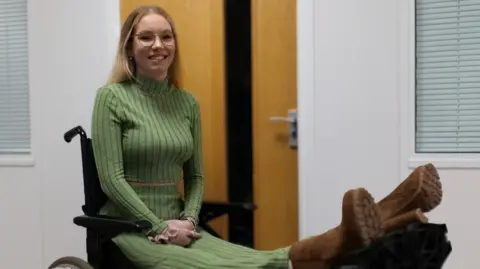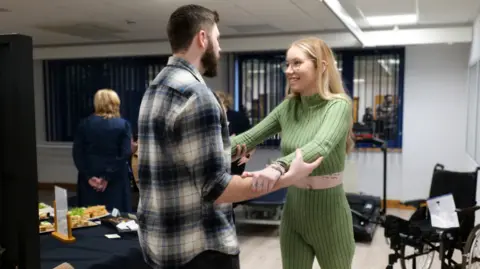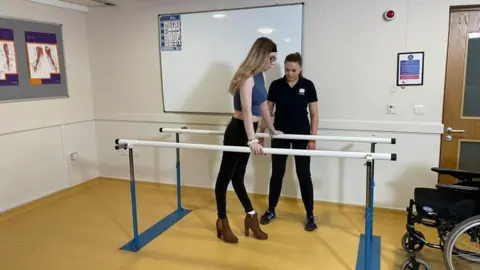BBC News, Peterborough
 Megan Dixon
Megan DixonMegan Dixon was 13 years old when she started feeling unwell.
By 16, her health had deteriorated to such an extent that she was taken to hospital after losing the ability to speak. Doctors believed she may have had a stroke.
She had only been due to remain there for four days for tests, but came out two years later completely paralysed. Unable to walk, talk or open her eyes, she was told she would never move again.
Megan was diagnosed with Functional Neurological Disorder (FND), which meant there was a problem with how her brain received and sent information to the rest of the body.
Having stayed in a neurological care home in Peterborough, she is now preparing to move into her own home with the hope of becoming a nail technician.
 Megan Dixon
Megan DixonMegan said at the age of 18, when she moved to Eagle Wood Neurological Care Centre, she was “still just a baby”.
She had never been on her own before and had to move away from her family near Bath to receive the care she needed.
“It was not easy. I think it was a lot harder for my mum and dad to have to leave me there on my own, but I couldn’t do anything for myself. I was paralysed from the neck down,” she told the BBC.
“I couldn’t see, I couldn’t talk. I hate the word, but I was very vulnerable at the time.
“I started feeling poorly when I was 13. It started off very slowly, very gradually and then in 2021, things just declined rapidly.
“I was taken into hospital because they were concerned I had had a stroke, or something, because I lost the ability to talk.
“I was taken for four days of tests and came out of hospital two years later.”
 Megan Dixon
Megan DixonHer illness was eventually diagnosed as FND.
“It stops the functioning of signals from the brain to your body from working properly and causes all sorts of neurological symptoms,” she said.
“I couldn’t do anything for myself, I lost the ability to talk.
“I couldn’t see, so I wasn’t able to open my eyes. My brain couldn’t register the difference between eyes closed and eyes being open.”
 Megan Dixon
Megan DixonShe also lost the ability to swallow and was fed by a feeding tube in her mouth, which has been replaced by one straight into her stomach.
At her worst, she had 50 seizures a day, but that has now reduced to between 10 and 15.
 Chloe O’Neill
Chloe O’NeillAfter 18 months of extensive therapy, her life is completely different.
She said: “I can move everything now. Obviously I can talk, I can see. I can’t walk and I’m never going to be able to walk again, but that’s because I’ve got contractions in my knees.
“I need surgery in order to bend them because my legs are stuck straight. It’s very painful, but I’m waiting on surgery, and it means I’m never going to be able to walk again.
“Honestly, it was something I never thought I would be planning when my parents took me to the care home. They thought that was it – that it was going to be my home for the rest of my life.
“I was getting to the point that I nearly died in hospital, my body just shut down that much.
“The doctors did have to tell my parents to prepare for the worst – they didn’t think I would make it to 18 and here I am at 20.”
Her dream is to be a nail technician and she is saving up to complete an online course.
“I really can’t wait to finally move out and get a place with my boyfriend,” she said. “I’m very excited.”
 Chloe O’Neill
Chloe O’NeillFND Action said the brain network disorder encompassed neurological symptoms including limb weakness, paralysis, seizures, walking difficulties, spasms, twitching, sensory issues and more.
“For many, symptoms are severe and disabling, and life-changing for all,” it said.
It added that while the basic wiring of the nervous system was intact, people with the disorder had a problem with how the brain or nervous system was “functioning”, and the brain failed to send or receive signals correctly.
“Historically FND has often been viewed as resulting purely from psychological and emotional trauma, this has frequently led to stigma and dismissal from medical professionals,” it added.
“This view is now seen as outdated, and psychological trauma is now viewed as a risk factor for developing the condition rather than the root cause.”
 Laura Foster/BBC
Laura Foster/BBCMegan said she had been left isolated, frustrated and exhausted at times due to how “unpredictable” life with FND had been.
She now shares her experiences on TikTok.
“Every small victory, whether it’s moving a finger, speaking a word, or simply making it through another day is worth celebrating,” she said.

